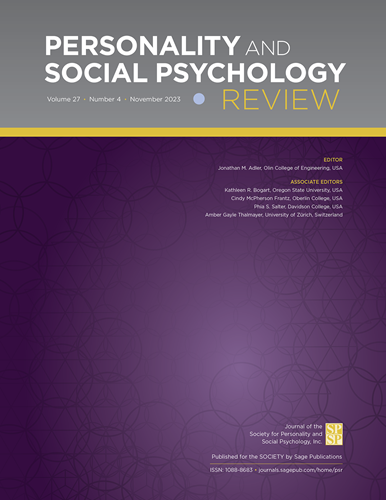The Next Chapter at PSPR.
IF 10.4
1区 心理学
Q1 PSYCHOLOGY, SOCIAL
Personality and Social Psychology Review
Pub Date : 2022-05-01
Epub Date: 2022-01-20
DOI:10.1177/10888683211071122
引用次数: 1
Abstract
Dear Readers, The story of Personality and Social Psychology Review (PSPR) is one of flourishing. In the quarter century since the Executive Committee of the Society for Personality and Social Psychology (SPSP) decided to launch a theory journal as a companion to its first empirical journal, PSPR’s impact has experienced a meteoric rise. For each year in the past decade, PSPR has held the highest impact factor of more than 60 scholarly journals ranked in its category (according to Clarivate Analytics). For 2020 (the last year for which we have data), the impact factor was 18.46. As we all know, the impact factor is a deeply flawed metric (e.g., M. S. Allen & Iliescu, 2021), but at least it offers one suggestion that the articles that appear in PSPR are shaping the field. The story of PSPR’s ascent has also been one of continuity. The prior incoming editorials published in the journal all comment on the success of the journal and all essentially pledge not to mess with things too much. There have certainly been important refinements, including the adoption of transparency and openness standards that apply to the small number of articles that report the results of quantitative analyses, such as meta-analyses. And the prior editorial teams have been adept stewards of the journal. They have shepherded its continued rise with unfailing attention to quality, allowing the journal to remain a beacon for our field. I want to especially thank Heejung Kim and David Sherman, the outgoing Co-Editors, who have not only been fantastic editors but have also been astoundingly supportive partners in the transition to our editorial term. They are everything I would have wished for in colleagues and I am deeply grateful. With this editorial, I want to both celebrate PSPR’s success and use its solid foundation to galvanize the journal in a somewhat new direction. This is a goal I am deeply familiar with, as it is something Olin College of Engineering, where I work, is actively engaged in pursuing (e.g., Barabino et al., 2021). Olin College has been recognized as the global leader in undergraduate engineering education (R. Graham, 2018), but shortly after taking office last year, Gilda Barabino, our second President, said, “nothing makes you so conservative as having something to conserve.” She did not mean that politically, she meant that once you develop a reputation for something, people expect you to keep doing it, but then you miss out on opportunities for innovation. Like Olin College, PSPR has developed a strong reputation, and like Olin College, it is time for PSPR to lead in a new direction. As you know, our field is in transition. The primary impetus for this transition and the central core of it have focused on how we conduct our work. I am speaking, of course, of the open science revolution. And I am incredibly supportive of the efforts many of our colleagues have taken to do what Brent Roberts, in his Presidential Address at the Association for Research in Personality’s 2019 conference, labeled “dedicating ourselves to shifting from getting it significant to getting it right” (B. W. Roberts, 2019). From my perspective, “getting it right” needs to be about more than just how we conduct our science, it also needs to be about what we study, who has the opportunity to enter and eventually lead our field, and why. And focusing on these issues is absolutely urgent—no less urgent than the shift toward open science—so, alongside an emphasis on how, what, who, and why, the when has to be now. I am not the first person to assert this, and I am happy to join the chorus of others calling for change (see Atherton et al., 2021; Buchanan et al., in press; Cheek, 2017; Funder et al., 2014; Ledgerwood et al., in press; Murphy et al., 2020; Plaut, 2010; S. O. Roberts et al., 2020; Spellman, 2015; Syed, 2021; Syed & McLean, in press; Thalmayer et al., 2021; Winston, 2020, as just a handful of examples of others issuing similar calls). The practice of science is inextricably cultural. The pursuit of excellent work therefore demands a pairing of the continual improvement of our methods with an enhanced attention to the social implications of our work, both for the people doing the work and the broader publics we hope to impact through the products of our work.PSPR的下一个篇章。
本文章由计算机程序翻译,如有差异,请以英文原文为准。
求助全文
约1分钟内获得全文
求助全文
来源期刊

Personality and Social Psychology Review
PSYCHOLOGY, SOCIAL-
CiteScore
19.00
自引率
1.90%
发文量
20
期刊介绍:
Title: Personality and Social Psychology Review (PSPR)
Journal Overview:
Official journal of SPSP, the Society for Personality and Social Psychology, Inc.
Premiere outlet for original theoretical papers and conceptual review articles in all areas of personality and social psychology
Features stimulating conceptual pieces identifying new research directions and comprehensive review papers providing integrative frameworks for existing theory and research programs
Topics Covered:
Attitudes and Social Cognition: Examines the inner workings of the human mind in understanding, evaluating, and responding to the social environment
Interpersonal and Group Processes: Explores patterns of interaction and interdependence characterizing everyday human functioning
Intergroup Relations: Investigates determinants of prejudice, conflict, cooperation, and harmonious relationships between social groups
Personality and Individual Differences: Focuses on causes, assessment, structures, and processes giving rise to human variation
Biological and Cultural Influences: Studies the biological and cultural mediation of social psychological and personality processes
 求助内容:
求助内容: 应助结果提醒方式:
应助结果提醒方式:


